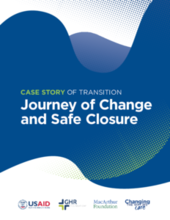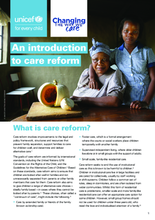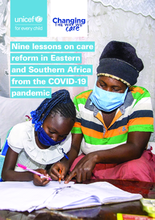Displaying 201 - 210 of 1627
A new United Nations report on Sudan released today in this capital warns about the situation of insecurity for children in armed conflicts in the country.
Join the Transforming Children’s Care Global Collaborative Platform Task Force on Family Reunification and Reintegration on a virtual panel on country examples of family reintegration in India, Uganda and Kenya.
This video is aimed at policy makers and programme managers just starting on the care reform journey.
The video provides key lessons learnt from COVID-19 on care reform from interviews with UNICEF, government and NGO staff in Rwanda, Uganda, Malawi and Kenya.
The Eastern and Southern Africa Regional Learning Platform hosted a webinar on September 20, 2022, with panel of experts who explored how the social service workforce can be strengthened to support care reform in Eastern and Southern Africa.
This is the beginning of three virtual presentations on country examples of family reintegration, starting with Rwanda and Cambodia as part of the Task Force on Family Reunification and Reintegration on the Transforming Children's Care Global Collaborative Platform.
The Task Force on Foster Care of the Transforming Children's Care Global Collaborative Platform held the fifth webinar in the spotlight series on Foster Care Practice on 15 September 2022. The webinar explored participation in foster care with particular focus on individual decision making for children and young people. We heard from people with lived experience of foster care in different contexts, including Uganda, Ireland and Argentina.
The Journey of Change and Safe Closure case story demonstrates the process of early engagement and awareness to supporting the long-term reintegration of children in families.
Although care reform is well established in some parts of the Eastern and Southern Africa, many countries in the region are just beginning their care reform journey. This short paper is aimed at these contexts. It explains what care reform is, the different components of care reform, why care reform is important and how to start a care reform process.
Key lessons learnt on how to carry out effective care reform in Eastern and Southern Africa from the COVID 19 pandemic.



